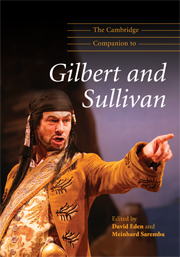Book contents
- Frontmatter
- Part I Background
- Part II Focus
- Part III Reception
- 11 Topsy-Turvy: a personal journey
- 12 Amateur tenors and choruses in public: the amateur scene
- 13 Champions and aficionados: amateur and listener experiences of the Savoy operas in performance
- 14 ‘How great thy charm, thy sway how excellent!’ Tracing Gilbert and Sullivan's legacy in the American musical
- 15 ‘See how the Fates their gifts allot’: the reception of productions and translations in continental Europe
- Part IV Into the twenty-first century
- Appendix 1 Who wrote the overtures?
- Appendix 2 Stage and choral works by Arthur Sullivan and W. S. Gilbert
- Appendix 3 Modern editions of works by Arthur Sullivan and W. S. Gilbert
- Appendix 4 Sullivan's archetypes of English opera
- Notes
- Bibliography and further reading
- Index
- Plate section
14 - ‘How great thy charm, thy sway how excellent!’ Tracing Gilbert and Sullivan's legacy in the American musical
from Part III - Reception
Published online by Cambridge University Press: 28 September 2011
- Frontmatter
- Part I Background
- Part II Focus
- Part III Reception
- 11 Topsy-Turvy: a personal journey
- 12 Amateur tenors and choruses in public: the amateur scene
- 13 Champions and aficionados: amateur and listener experiences of the Savoy operas in performance
- 14 ‘How great thy charm, thy sway how excellent!’ Tracing Gilbert and Sullivan's legacy in the American musical
- 15 ‘See how the Fates their gifts allot’: the reception of productions and translations in continental Europe
- Part IV Into the twenty-first century
- Appendix 1 Who wrote the overtures?
- Appendix 2 Stage and choral works by Arthur Sullivan and W. S. Gilbert
- Appendix 3 Modern editions of works by Arthur Sullivan and W. S. Gilbert
- Appendix 4 Sullivan's archetypes of English opera
- Notes
- Bibliography and further reading
- Index
- Plate section
Summary
Tracing artistic legacy and ancestry is always a complex affair, and must ultimately depend more on persuasive example and argument than on an abundance of hard evidence. In the case of Gilbert and Sullivan and the American musical, there can be no real question that the influence of the former on the latter was profound, especially with HMS Pinafore (1878) coming so soon after The Black Crook (1866). The huge success of HMS Pinafore and its successors in America – then and since, in adaptations and repertoire – provided both motive and opportunity. Moreover, there is ample testimony, especially from lyricists, regarding the formative impact of Gilbert and Sullivan on important contributors to the American musical. But a broadly based, direct connection is nevertheless hard to argue in the face of stark differences in sensibility. The earnest optimism and elaborate choreography and stage effects typical of the American musical from its late nineteenth-century origins through its twentieth-century maturity seem quite distinct from the wry topsy-turvydom of Gilbert and Sullivan, and the differences multiply quickly upon fuller consideration.
There are, to be sure, more than a few incontrovertible homages. George M. Cohan's ‘Captain of the ten day boat’ (Little Johnny Jones, 1904) is a direct parody of ‘Captain of the Pinafore’. George and Ira Gershwin's Strike Up the Band! (1927), Of Thee I Sing (1931; the first musical to win a Pulitzer Prize) and the latter's sequel, Let ‘em Eat Cake (1933), follow the larger Savoy tradition in offering full-scale political satires that are both oblique and ridiculous enough in their particulars not to offend, with songs such as ‘The illegitimate daughter’ (from Of Thee I Sing) to reinforce the connection to Gilbert and Sullivan.
- Type
- Chapter
- Information
- The Cambridge Companion to Gilbert and Sullivan , pp. 201 - 215Publisher: Cambridge University PressPrint publication year: 2009
- 1
- Cited by



